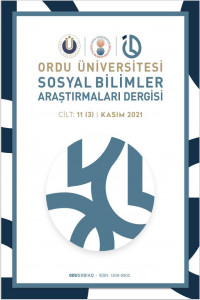Research Article
Review
Book Review
Issue Editorial Board





Türk Fransız Deniz Ticareti, Osmanlı Denizcilik Tarihi, Osmanlı Sosyal Tarihi, Lübnan Tarihi,





Aim & Scope
The aim of Ordu University Journal of Social Sciences Research (ODÜSOBİAD) is to carefully evaluate qualified and original studies in accordance with scientific principles and science ethics, and published regularly 3 issues a year (March, July, November) and preferred in the field of social sciences. to take place among the journals.
It is committed to producing qualified academic knowledge and delivering it to anyone interested in science through an open access system. With this in mind, all our articles in our journal are archived on our website and are presented to our dear readers without the need for membership.
The language of the journal is Turkish and English.
Archaeology,
History of art,
History,
Turkish language and literature,
Sociology,
Geography,
Western Languages and Literature,
Economy,
Business,
Public administration,
Finance,
International relations,
Law,
Public relations and advertising
Fine Arts
Philosophy and Religious Studies,
Basic Islamic Sciences, etc. It includes academic studies in the field of social sciences, and publication evaluation / critical / promotional articles on these areas are also included in the journal.
Author Guidelines
OCIAL SCIENCES INSTITUTE JOURNAL OF SOCIAL SCIENCES RESEARCH,
It publishes research or articles covering areas such as Educational Sciences, Economics, Business, Law, Fine Arts, Sociology, Literature, History, Political Science, Archeology, Geography, Philosophy, Communication Sciences, Philology and Theology.
Articles sent to the journal are sent to 2 referees (blind refereeing) via the field editor, if deemed appropriate, after pre-control. If necessary, it can be sent to the 3rd referee. The field editor can also review the submitted article as a referee. Incoming articles should not be expected to be published in the first issue after the first submission date of the article, depending on field density.
Manuscripts submitted to the journal must not have been published before or submitted to another journal for publication.
The plagiarism (similarity) rate report of the manuscripts to be sent to the journal should be taken by the author and sent with the article. The similarity rate should not be more than 20% for the publication of the study. The similarity rate of the submitted articles is also received by our journal with the iThenticate program.
Manuscripts submitted for publication must be prepared in accordance with the academic writing rules and in either Turkish or English.
The copyright of any published work belongs to the journal. The copyright form should be filled in and sent with the article.
The relevant editor can make the spelling corrections he deems necessary. The summary in a foreign language can be corrected if deemed necessary by the foreign language editor.
The opinions expressed in the articles published in the journal bind its authors. All legal responsibility of the articles belongs to their authors.
No royalty fee is paid for published articles.
In scientific studies to be sent to the journal, maximum attention should be paid to compliance with research and publication ethics. If the permission of the ethics committee is required for the submitted articles, the permission document should be attached. If you think that your article does not require the permission of the ethics committee, fill in the "Ethics Committee Exemption Statement" and upload it to the system.
It is recommended to use Zotero, Mendeley or Endnote in article writing for international compliance.
CLICK for the user manual of the Endnote program in the ISNAD Atıf System.
CLICK for Zotero User Manual
CLICK for Mendeley User Manual. Daha fazla bilgi için https://www.mendeley.com
Article proposals should be prepared by downloading the article template from the web page of our journal.
Book Review Writing Rules
A book presentation should be a critical evaluation of a work, not just a summary. If the author disagrees with the book, he should state, indicate the sample aspects or deficiencies of the book, or if he agrees with the book author, he should express it. The author who promotes the book should address the contribution of the publication to the world of science, whether the sources he used are sufficient or not.
Book review author,
Explain why the book is worth reading,
If it brings a new approach, it should examine the methods used by the author,
It should clearly state the purpose of the author in his book,
If the author of the book review makes a positive or negative comment, he should explain it with exemplary reasons,
The author should always maintain objectivity and avoid personal comments,
Book review texts should be between 1500-3000 words,
The cover page of the work in which the review is made must be attached to the article.
Title information should include the name of the work promoted or reviewed, its author, the city and publisher it was published in, the year of publication, the number of pages and the ISBN number. The name and surname of the author should be left justified and an explanation mark should be placed under the title information and the author information should be given under the page. The cover photo of the book should be placed on the first page.
Submission Rules
The articles submitted to the Journal of Social Sciences Researches of Ordu University Institute of Social Sciences (ODÜSOBİAD) should be prepared in the reference system, footnote format and bibliography arrangement in the style of American Psychological Association (APA) 6.0 or ISNAD 2 citation style. Articles written other than these will not be accepted. The submitted article should not have been published before and should not be submitted to any journal for evaluation.
Ethics Committee Approval
According to the decisions taken by the relevant boards of TÜBİTAK ULAKBİM TR DIZİN, among the authors of the articles that are indexed in TR DİZİN for 2020 and will be submitted for publication in all journals that are at the stage of evaluation;
Researches requiring the permission of the Ethics Committee are as follows.
• All kinds of research conducted with qualitative or quantitative approaches that require data collection from participants using questionnaires, interviews, focus group work, observation, experimentation, interview techniques.
• Use of humans and animals (including material / data) for experimental or other scientific purposes,
• Clinical trials on humans,
• Research on animals,
Retrospective studies in accordance with the law on protection of personal data,
Also;
• Stating that "informed consent form" was obtained in case presentations,
• Obtaining and indicating permission from the owners for the use of scales, questionnaires and photographs belonging to others,
• Stating that the copyright regulations are complied with for the intellectual and artistic works used.
For detailed information, see;
https://tubitak.gov.tr/sites/default/files/20689/ekbn_2020.pdf
https://tubitak.gov.tr/sites/default/files/20689/ legal_ozel_izin_belgesi_bilgi_notu.pdf
NOTE: Retrospective ethics committee approval is not required for articles that have been used prior to 2020 research data, produced from master's / doctorate studies (should be specified in the article), published articles submitted to the journal in the previous year, accepted but not yet published. Please indicate in the declaration form that your work carries this situation.
In studies requiring ethics committee approval, information about the permission (name of the board, date and number) should be included in the method section and also on the first / last page of the article.
Ethics Committee Approval
According to the decisions taken by the relevant boards of TÜBİTAK ULAKBİM TR DIZİN, among the authors of the articles that are indexed in TR DİZİN for 2020 and will be submitted for publication in all journals that are at the stage of evaluation;
Researches requiring the permission of the Ethics Committee are as follows.
• All kinds of research conducted with qualitative or quantitative approaches that require data collection from participants using questionnaires, interviews, focus group work, observation, experimentation, interview techniques.
• Use of humans and animals (including material / data) for experimental or other scientific purposes,
• Clinical trials on humans,
• Research on animals,
Retrospective studies in accordance with the law on protection of personal data,
Also;
• Stating that "informed consent form" was obtained in case presentations,
• Obtaining and indicating permission from the owners for the use of scales, questionnaires and photographs belonging to others,
• Stating that the copyright regulations are complied with for the intellectual and artistic works used.
For detailed information, see;
https://tubitak.gov.tr/sites/default/files/20689/ekbn_2020.pdf
https://tubitak.gov.tr/sites/default/files/20689/ legal_ozel_izin_belgesi_bilgi_notu.pdf
NOTE: Retrospective ethics committee approval is not required for articles that have been used prior to 2020 research data, produced from master's / doctorate studies (should be specified in the article), published articles submitted to the journal in the previous year, accepted but not yet published. Please indicate in the declaration form that your work carries this situation.
In studies requiring ethics committee approval, information about the permission (name of the board, date and number) should be included in the method section and also on the first / last page of the article.
Bibliography Cambria bold, 11 pt paragraph spacing before 3 pt after 6 pt
The bibliography should be written in 10 font size, without indent, hanging, 1.25, aligned on both sides and single line spacing. One of the APA 6.0 and ISNAD 2 citation systems can be used to cite and cite the articles to be sent to the journal of Odü Social Sciences Research. For this reason, it is recommended to use Zotero, Mendeley or Endnote programs in order for the articles to be submitted to be suitable for the reference system and in terms of international compliance. Extensive information about these programs is given above.
Extended Abstract:
After the bibliography, there should be an extended abstract in Turkish articles, provided that they should be Cambria Italic, 9 font size, at least 500 and 1000 words, and an extended abstract in English articles should be in Turkish. The Extended Abstract should be written after the acceptance of the article by the journal
CLICK FOR APA 6 SYSTEM REFERENCES AND REFERENCES.
CLICK TO SHOW ISNAD 2 SYSTEM FOOTNOTE AND SOURCES.
*** If one of the items in the checklist is missing, the article will not be evaluated.
Organizing the article according to the magazine article template,
Compliance of the article with the current writing rules of the journal,
Title (Turkish-English), author information (title, institution, e-mail, ORCID ID),
Abstract (150-300 words)
Abstract (to be checked by our foreign language editor),
Keywords (5 words),
Main text (4,000-9,000 words excluding abstracts and bibliography),
Tables and figures (should have numbers and titles, reference should be made in the text, only visual expression should be used for tables and all figures, maximum 20),
Footnote (Footnotes should not be used for reference) • Quotations (if it exceeds 40 words, block quote, italic within the quote),
Citations and Bibliography APA 6 or ISNAD 2 edition must be appropriate,
Extended Abstract (500-1000 words will be added in case of acceptance of the article, provided by our foreign language editor),
Copyright Transfer Form must be uploaded through the system,
Uploading the Ethics Committee Declaration Form on the system.
System implementation of plagiarism report (maximum 20% similarity, similarity report will be taken by the editor of our journal)
* The shipments in the order according to this formal should not exceed 30. Do not transfer the expanded English summary for the content of the publication to this page boundary.
.......... ARTICLES THAT DO NOT APPLY TO THESE RULES CANNOT BE TAKEN INTO EVALUATION .........
Ethical Principles and Publication Policy
Publication Ethics
The publication processes implemented in ODÜSOBİAD constitute the basis for the development and distribution of information in an impartial and respectful manner. The processes implemented in this direction are directly reflected in the quality of the work of the authors and the institutions that support the authors. Peer-reviewed studies are studies that embody and support the scientific method. At this point, it is important that all stakeholders of the process (authors, readers and researchers, publishers, referees and editors) comply with the standards of ethical principles. Our journal is expected to bear the following ethical responsibilities from all stakeholders within the scope of publishing ethics.
While creating the ethical duties and responsibilities below, the guidelines and policies published by the Committee on Publication Ethics (COPE) and YÖK Scientific Research and Publication Ethics Directive are taken into consideration.
Ethical Responsibilities of Authors
Author (s) who submit a study to ODÜSOBİAD are expected to comply with the following ethical responsibilities;
It is expected that the works submitted by the author (s) will be original. If the author (s) benefit from or use other studies, they must cite and / or quote completely and accurately.
Persons who do not contribute to the content intellectually in the creation of the study should not be specified as authors.
The situations and relationships of all studies submitted for publication that may constitute a conflict of interest, if any, should be explained.
Raw data related to their articles may be requested from the author (s) within the framework of the evaluation processes, in such a case, the author (s) should be ready to present the expected data and information to the editorial board and scientific board.
The author (s) must have a document showing that they have the rights to use the data used, the necessary permissions for the research / analysis, or that the consent of the experimental subjects has been obtained.
In the event that the author (s) notices a mistake or mistake regarding the published work, in the early view or evaluation stage, the journal editor or publisher has an obligation to cooperate with the editor in informing, correcting or withdrawing.
Authors cannot have their work in the application process of more than one journal at the same time. Each application can be started following completion of the previous application. Work published in another journal cannot be sent to us.
Changing the author responsibilities of a study whose evaluation process has started (such as adding an author, changing the order of the author, removing the author) cannot be proposed.
Editors' Ethical Duties and Responsibilities
ODÜSOBİAD editors and field editors should have the following ethical duties and responsibilities on the basis of the "COPE Code of Conduct and Best Practice Guidelines for Journal Editors" and "COPE Best Practice Guidelines for JournalEditors" guidelines published by the Committee on Publication Ethics (COPE) as open access:
General duties and responsibilities
Editors are responsible for every publication published in the journal. In the context of this responsibility, editors have the following roles and responsibilities:
- Making an effort to meet the information needs of readers and writers,
-Continuous development of the journal,
- Conducting the processes to improve the quality of the studies published in the journal,
-Supporting freedom of thought,
-Ensuring academic integrity,
- Continuing business processes without compromising intellectual property rights and ethical standards,
- Show clarity and transparency in terms of publication in matters that require correction and explanation.
Relations with the reader
Editors should make decisions by considering the knowledge, skills and experience expectations of all readers, researchers and practitioners. The published studies should be paid attention to the readers, researchers, practitioners and contributors to the scientific literature and to be original. In addition, editors are obliged to take into account the feedback from readers, researchers and practitioners, and to provide explanatory and informative feedback.
Relations with authors
Editors' duties and responsibilities towards authors are as follows:
- Editors should make positive or negative decisions based on the importance of the studies, the original value, validity, clarity of expression, and the journal's goals and objectives.
- Unless the studies that are suitable for the scope of the publication do not have a serious problem, they should be included in the pre-evaluation stage.
Editors should not ignore the positive referee suggestions unless there is a serious problem with the work.
-New editors should not change the decisions made by the previous editor (s) regarding the work, unless there is a serious problem.
- "Blind Review and Evaluation Process" must be published and editors must prevent any deviations that may occur in the defined processes.
- Editors should publish a "Author's Guide" that includes in detail every subject that will be expected from them by the authors. These guides should be updated periodically.
- Authors should be provided with descriptive and informative notification and feedback.
Relations with referees
Editors' duties and responsibilities towards referees are as follows:
- The referees should determine in accordance with the subject of the study.
-It is obliged to provide the information and guides that the referees will need during the evaluation phase.
- It has to observe whether there is a conflict of interest among the authors and referees.
- Blindness should keep the identity information of the referees confidential in the context of refereeing.
Encourage referees to consider working in an impartial, scientific and objective language.
-The referees should evaluate with criteria such as timely return and performance.
- It should determine practices and policies that increase the performance of referees.
- The referee should take the necessary steps to dynamically update the pool.
- It should prevent impolite and unscientific evaluations.
- The referee should take steps to ensure that the pool consists of a wide spectrum.
Relations with the editorial board
Editors should ensure that all editorial board members advance processes in accordance with editorial policies and guidelines. The editorial board should inform its members about the editorial policies and keep them informed of the developments. The new editorial board should educate its members on broadcasting policies and provide the information they need.
In addition, the editors;
- The members of the editorial board should ensure that they evaluate the work impartially and independently.
- New editorial board members should be able to contribute and should be determined as appropriate.
- The editorial board members should submit studies suitable for their field of expertise for evaluation.
-It should be in regular interaction with the broadcast board.
- Organize meetings with the editorial board at regular intervals for the development of publishing policies and the journal.
Relations with the magazine owner and publisher;
The relationship between editors and publisher is based on the principle of editorial independence. In accordance with the written contract between the editors and the publisher, all decisions taken by the editors are independent of the publisher and the magazine owner.
Editorial and blind review processes
Editors; It is obliged to implement the "Blind Refereeing and Evaluation Process" policies in the journal publishing policies. In this context, editors ensure that each work is completed in a fair, impartial and timely evaluation process.
Quality assurance:
Editors; It is responsible for publishing every article published in the journal in accordance with the journal publishing policies and international standards.
Protection of personal data:
Editors; It is obliged to ensure the protection of personal data regarding the subjects or images included in the evaluated studies. Unless the express consent of the individuals used in the studies is documented, it is responsible for refusing to work. In addition, the editors; is responsible for protecting the individual data of the author, referee and readers.
Ethics committee, human and animal rights:
Editors; is obliged to ensure the protection of human and animal rights in the evaluated studies. Ethics committee approval for the subjects used in the studies is responsible for refusing to work in cases where there are no permissions for experimental research.
Prevention against possible misconduct and misconduct:
Editors; is obliged to take precautions against possible misconduct and misconduct. In addition to conducting a meticulous and objective investigation in determining and evaluating complaints regarding this situation, it is among the editor's responsibilities to share the findings on the subject.
To ensure academic publication integrity:
Editors should ensure that any errors, inconsistencies, or misleading judgments in the work are quickly corrected.
Protection of intellectual property rights:
Editors; It is obliged to protect the intellectual property rights of all published articles and to defend the rights of the journal and the author (s) in possible violations. In addition, editors are obliged to take the necessary measures to ensure that the content in all published articles does not violate the intellectual property rights of other publications.
Constructiveness and openness to discussion:
Editors; should take into account the persuasive criticism of the works published in the journal and display a constructive attitude towards these criticisms.
It should give the author (s) the right to reply to the criticized studies.
He should not ignore or exclude studies with negative results.
Complaints:
Editors; is responsible for responding in an enlightening and descriptive manner by carefully examining the complaints from authors, referees or readers.
Political and Commercial concerns:
Journal owner, publisher, and any other political or commercial element does not affect the independent decision-making of the editors.
Conflicts of interest:
Editors; It guarantees the independent and impartial completion of the publication process of the studies, taking into account the conflicts of interest between the author (s), referees and other editors.
Ethical Responsibilities of Referees:
- The evaluation of all studies by "Blinding Refereeing" directly affects the quality of the publication. This process provides confidence through objective and independent evaluation of the publication. ODÜSOBİAD evaluation process is carried out with the principle of double-blind arbitration. Referees cannot contact the authors directly, evaluations and comments are submitted through the journal management system. In this process, referee comments on evaluation forms and full texts are sent to the author (s) through the editor. In this context, it is expected that referees evaluating a study for our journal will have the following ethical responsibilities:
-Only work related to the field of expertise should accept to be evaluated.
- It should be evaluated in an impartial and confidential manner.
- If he / she thinks that he / she faces a conflict of interest during the evaluation process, he / she should refuse to examine the study and inform the editor of the journal.
- In accordance with the principle of confidentiality, they should destroy the studies they examine after the evaluation process. They can only use the final versions of the studies they have reviewed, only after they have been published.
- The evaluation should be made objectively only in relation to the content of the study. It should not allow nationality, gender, religious beliefs, political beliefs, and business concerns to influence the assessment.
-The evaluation should be made in a constructive and courteous language. He should not make derogatory personal comments that contain hostility, slander and insult.
- They should perform the work they have accepted to be evaluated, in a timely manner and with the above ethical responsibilities.
Publisher's Ethical Responsibilities
The Board of Directors of the Journal acts with the awareness of the following ethical responsibilities:
Editors are responsible for all processes of work submitted to the journal. In this context, the decision makers are editors, regardless of economic or political gains.
The independent editor commits to making the decision.
ODÜSOBİAD protects the property and copyright of every published article and undertakes the obligation to keep the records of each published copy.
It has the responsibility to take all kinds of scientific misconduct, citation fraud and plagiarism related to editors.
If You Face an Unethical Situation:
If you encounter any unethical behavior or content other than the above mentioned ethical responsibilities in our journal, please report it to odudergi@gmail.com via e-mail.
Price Policy
Dergimizde yayımlanan makaleler için herhangi bir ücret alınmamaktadır.
Article submission / process operation is free of charge







